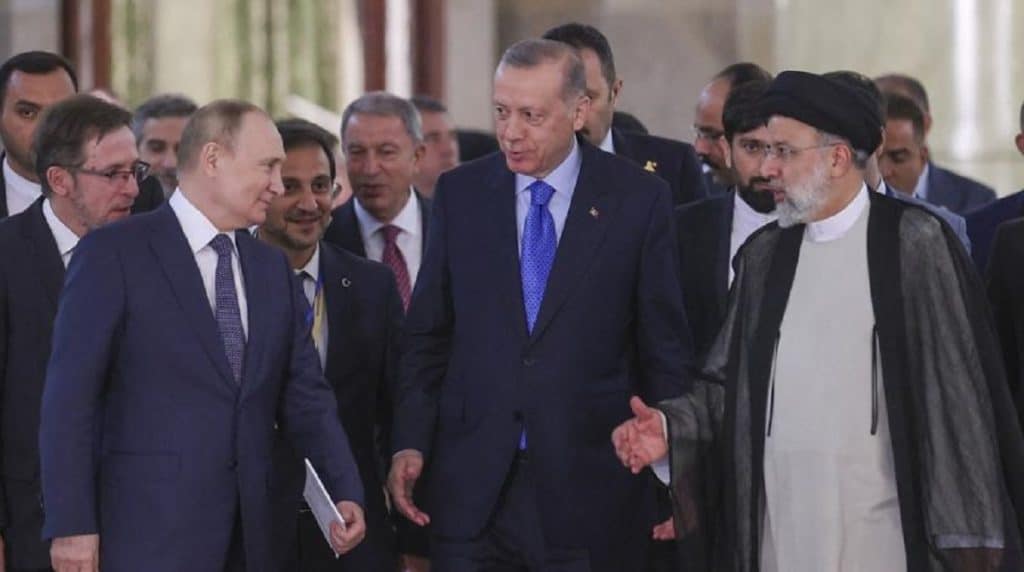By Hafsa Akram
The Turks are increasingly convinced that normalization is near between their government and Damascus, a main regional goal under the new policy pursued by Turkish President Recep Tayyip Erdogan for more than a year, mainly due to the political and economic crises that threaten its political future.

This conviction is supported by Turkish official statements made recently by top Turkish officials, including President Erdogan and his Foreign Minister, to journalists and writers close to the authorities in Ankara, and in parallel by Turkey’s warming relations with Tehran and Moscow, allies of Damascus.
However, Erdogan’s calculations with Damascus are more complex than those with other capitals and more difficult.
The Turkish president and his foreign minister have always tried to insinuate secret contacts with Syria, while Damascus has recently responded to these insinuations in harsh tones, attributing these statements to internal political quarrels within Turkey.
Last February, the Syrian Foreign Minister announced Damascus’ conditions for normalization with Ankara, but pointing out that Syria, unlike Ankara, does not consider the SDF, the Kurdish Democratic Union Party and the People’s Protection Units, terrorist organizations, not to mention the other many thorny issues between the two countries. These contrasts make it difficult for Tehran and Moscow to achieve reconciliation between their Syrian and Turkish allies.
Duygu Sezer, author of a number of political books, claims that Russia reminded Ankara, during the Sochi summit in 2019, which put an end to the operation “Spring Peace”, that Moscow is ready to play the role of mediator between Turkey and Syria and that achieving reconciliation between Erdogan and Bashar al-Assad has never been absent from the Russian action agenda, and Vladimir Putin is constantly pointing Erdogan towards Damascus.
However, the dilemma over the SDF, and the Turkish position determined to conduct a military operation against it. remains an obstacle for Moscow in undertaking the reconciliation mission, in light of its adherence to the rejection of any military move in Syria, which it repeated in Sochi, albeit accompanied by the phrase “understanding legitimate Turkish concerns”.
Russian-Iranian relations have taken on a strategic aspect against the backdrop of the Ukrainian war. Iran, like Turkey, is an important window for Russia to the outside world, also in light of the sanctions imposed on it.
Since Turkey’s first military operation in Syria, launched by Ankara only five weeks after the coup attempt on 15 July 2016, Turkish military operations have started within two, or three days at most, from the day after Erdogan spoke about it. This time, Erdogan announced his intention to launch the military operation on 23 May, and although almost three months have passed since the announcement, Turkish military action has not materialized.
The main reason why Erdogan did not launch the military operation in Syria may be the Iranian-Russian opposition. Ankara felt offended when the Iranian Supreme Guide, Ali Khamenei, described some jihadist groups receiving support from Turkey as terrorist organizations, without mentioning the Kurdistan Workers’ Party, and advised Erdogan to talk to Assad.
As for Russia, Moscow has been intransigent in the face of any Turkish move outside the framework of bilateral coordination, and has bombed or supervised the bombing of a Turkish military convoy that led to the killing of 34 Turkish soldiers on 27 February 2020, during the Syrian army’s military operation to restore the control on Southern Idlib.
At the end of the Sochi meeting, Putin and Erdogan in a joint statement agreed in fighting together against all types of terrorist organizations in Syria. However, although Ankara tries to portray this as an agreement on its military operation, the definition of ‘all types of terrorist organizations’ dispels this perception. Russia does not consider the PKK to be a terrorist organization, whereas it considers the Muslim Brotherhood, and some of the jihadist organizations that Ankara supports against Damascus, to be terrorist.
Author: Hafsa Akram – Pakistani-based contributing Writer at Midstone Center for International Affairs, and an intern Trainee at Foreign Policy Research Centre ( FPRC). She writes for The Pakistan Daily, Millichronicle. Her Area of expertise is Afghanistan Conflict, Middle East affairs.
(The views expressed in this article belong only to the author and do not necessarily reflect the views of World Geostrategic Insights).
Image Credit: AFP/Turkish Presidency – The picture taken and released by the Turkish Presidency on July 19, 2022 shows Turkish President Recep Tayyip Erdogan, Iranian President Ebrahim Raisi and Russian President Vladimir Putin arriving for a joint news conference after at the end of the Astana Trilateral Summit at the Tehran International Conference Hall in Tehran.







